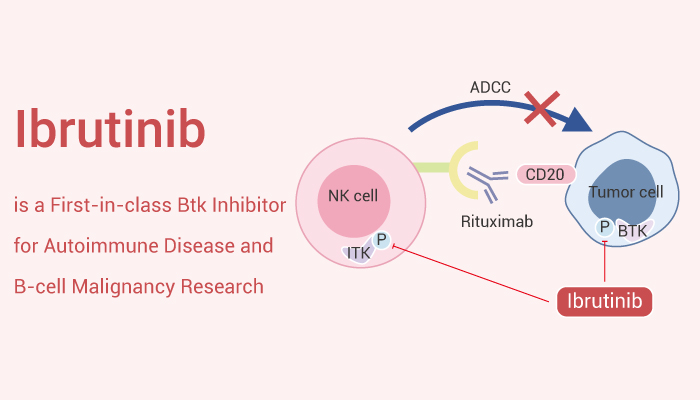Bruton tyrosine kinase (Btk), a non-receptor kinase, is a member of the Tec family kinases. Btk is exists in B cells and myeloid cells. Btk has a carboxy-terminal catalytic domain adjacent to SH2 and SH3 (src homology 2 and 3) domains. Although the substrates phosphorylated by Btk have not yet been identified, like other tyrosine kinases, Btk is thought to function in signal transduction. Importantly, Btk plays a well-characterized role in B-cell antigen receptor (BCR)-signaling and B-cell activation.
Antigen binding to the BCR results in B cell receptor oligomerization, Syk and Lyn kinase activation, followed by Btk kinase activation. Once activated, Btk forms a signaling complex with proteins such as BLNK, Lyn, and Syk and phosphorylates phospholipase C (PLC)γ2. This leads to downstream release of intracellular Ca2+ stores and propagation of the BCR signaling pathway through extracellular signal-regulated kinase and NF-κB signaling, ultimately resulting in transcriptional changes to foster B cell survival, proliferation, and/or differentiation. Therefore, Btk plays a crucial role in B cell development and activation through the BCR signaling pathway and represents a new target for diseases characterized by inappropriate B cell activity.

Ibrutinib (PCI-32765) is a selective, irreversible Btk inhibitor.
Ibrutinib inhibits B-cell proliferation and survival by irreversibly binding the protein Btk. It inhibits autophosphorylation of Btk, phosphorylation of Btk’s physiological substrate PLCγ, and phosphorylation of a further downstream kinase, ERK. Thus, blocking BTK inhibits the B-cell receptor pathway, which is often aberrantly active in B cell cancers. Ibrutinib is therefore effctive for such cancers, including mantle cell lymphoma, chronic lymphocytic leukemia, and Waldenström’s macroglobulinemia. Besides, following FcγR stimulation, Ibrutinib inhibits TNFα, IL-1β and IL-6 production in primary monocytes. Therefore, Ibrutinib reduces the level of circulating autoantibodies and completely suppresses disease in mice with collagen-induced arthritis. In a therapeutic CIA model, Ibrutinib dose-dependently and potently reverses arthritic inflammation.
All in all, Ibrutinib is a selective and irreversible Btk inhibitor that can be used for the research of autoimmune disease and B-cell malignancy.
References:
[1] Singh SP, et, al. Mol Cancer. 2018 Feb 19;17(1):57.
[2] Honigberg LA, et, al. Proc Natl Acad Sci U S A. 2010 Jul 20;107(29):13075-80.